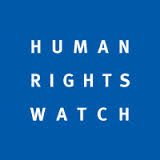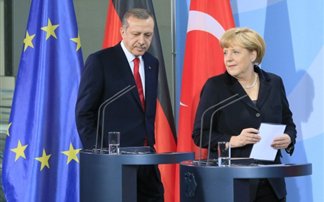Mr. Yannis Mouzalas
Minister Ministry of migration policy
2 Evangelistrias Street
10563 Athens
Greece
Dear Minister Mouzalas,
I am writing to you to express Human Rights Watch’s deep concern at the dramatic increase in the number of unaccompanied migrant children detained in “protective custody” in police station cells and pre-removal detention centers across Greece. I urge you to immediately end this practice and find space for those unaccompanied children currently in custody in open facilities with decent living conditions where they can receive care and counseling, and have access to legal aid and other basic services.
On July 19, according to data from Greece’s National Center for Social Solidarity (EKKA), 117 unaccompanied children were being detained under the police protective custody regime, while awaiting placement in a shelter. This is in stark contrast to the figures from November 2016, when only two unaccompanied children were being so detained.
Human Rights Watch raised concerns with your ministry in 2016 about the dire conditions faced by unaccompanied migrant children detained in Greece, in reports published in July and September of that year.
Our research then found that unaccompanied children were held for weeks and in some cases months in small, overcrowded and unsanitary police station cells. In some cases, they were held with unrelated adults even though this increases the risk of abuse and sexual violence and violates international and national law requiring the separation of adults from children in detention. The children did not receive information about their rights or about the process of seeking asylum, and many of them experienced psychological distress linked to the conditions in which they were held. We are concerned little has changed.
According to a July 20 open letter by the Hellenic Federation of Police Officers, migrant children are detained “as adults, under dreadful conditions in police detention facilities as common criminals.” The police union notes that instead of being hosted in appropriate conditions, these children are “incarcerated alongside criminals in police detention facilities, in an otherwise European country.” On July 31, the Greek Ombudsman criticized the prolonged detention of unaccompanied children in unsafe and inappropriate conditions at police stations and refugee camps describing it as “blatant violations of the rights of unaccompanied, underage refugees and migrants.” The Greek nongovernmental organization ARSIS (Association for the Social Support of Youth), raised similar concerns in a recent public announcement highlighting the unacceptable conditions experienced by unaccompanied children in the pre-removal detention facility of Amygdaleza.
Under international law, binding European directives, and Greek national law, detention of unaccompanied children can be used only as a measure of last resort, in exceptional circumstances, and for the shortest appropriate period. The UN Committee on the Rights of the Child has said that children should not be detained solely because of their immigration status or on the basis that they are unaccompanied.
Human Rights Watch is also concerned about the impact of the Greek Government’s assumption of responsibility for managing all aspects of service provision for asylum seekers on the Greek islands and for unaccompanied children throughout Greece. On July 12, seven nongovernmental organizations, including Médecins Sans Frontières, the International Rescue Committee and Save the Children, issued a joint statement raising concerns that the end of NGO funding will mean that at least five shelters for unaccompanied children are set to close, resulting in fewer shelter spaces available and potentially raising the number of children in detention.
As you know, as a result of the new arrangements, the majority of European funding provided directly to NGOs running services for unaccompanied migrant children ended on July 31, 2017, and the European Commission will support the Government to manage all aspects of the response through asylum, migration and integration funds (AMIF) and internal security funds (ISF) through DG HOME.
We recognize that Greece faces a significant and disproportionate responsibility among European Union member states due to the continued arrival of migrants and asylum seekers, including unaccompanied children, and agree that the rest of the EU should set up and implement a meaningful responsibility-sharing mechanism. Nevertheless, this situation does not relieve Greece of its obligation to do its utmost to protect unaccompanied migrant children and ensure that they are treated in a humane way and that their rights are respected.
We urge you to ensure that your ministry and the Greek authorities as a whole take the following steps:
- Move urgently to ensure that unaccompanied children currently in detention are accommodated elsewhere in facilities suitable for children, by prioritizing efforts to create short-term alternatives to detention, including safe spaces in refugee camps.
- End the practice of automatic detention of unaccompanied children, and make individual assessments of the needs of each child based on their best interest.
- Amend legislation to shorten significantly the maximum amount of time unaccompanied children may be detained in protective custody in exceptional, emergency circumstances, and ensure that children are never detained in excess of the time permitted under law.
- Stop using police stations as de facto detention centers for children, urgently improve detention conditions in police-run facilities and ensure that any children in detention have access to interpretation services, information about the purpose of their detention, counseling, legal aid, and educational and recreational materials.
- While ensuring adequate conditions, increase the number of spaces in existing long-term care facilities for unaccompanied children, create new facilities to the level required to ensure placements for all unaccompanied children in the country, and establish a national, government-run foster family system.
- Develop, after consultations with the United Nations and civil society organizations, and publicly announce a national action plan for the transition period and for the following period. This plan should include necessary measures to avoid any disruption or further deterioration of the services and living conditions of unaccompanied children in Greece.
Thank you for your attention to these important matters. We look forward to a continued dialogue.
Sincerely,
Hugh Williamson
Executive Director
Europe and Central Asia Division
Human Rights Watch



















